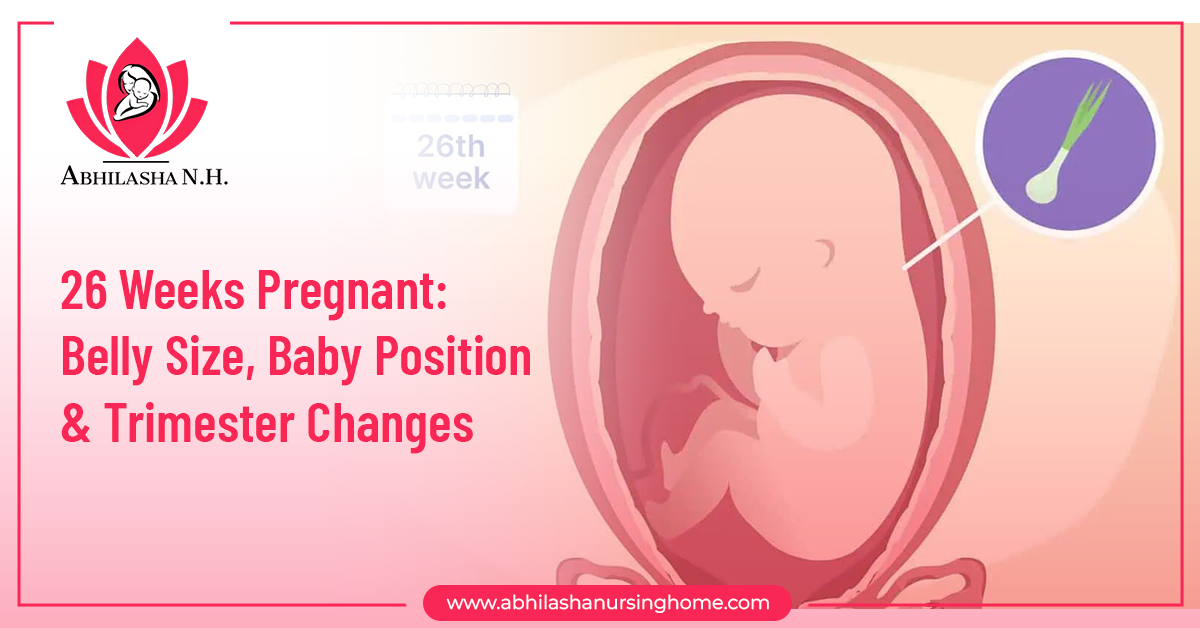Every week of pregnancy brings new changes, and the 26th week is one of the most important ones. Dr. Abhilasha Prakash, a senior gynecologist and obstetrician with over 33 years of experience, explains what to expect, what symptoms are normal, and how to take proper care of yourself and your growing baby.
By the 26th week, many physical and emotional changes become more prominent. Blood pressure may start to increase, swelling of hands and feet is common, and shortness of breath can begin. Let’s break it all down for you.
26th Week Pregnancy: Overview Table
| Topic | Details |
|---|---|
| Week of Pregnancy | 26th Week |
| What’s Happening | Rapid baby growth, expanding uterus |
| Baby’s Development | Baby is about 14 inches, 900 grams, developing lungs & brain rapidly |
| Size of Baby | About the size of a large zucchini |
| Symptoms | Swelling, breathlessness, high BP, fatigue, backache |
| Pregnancy Test? | Glucose test, thyroid, hemoglobin, urine analysis, RH factor test |
| Hormones | Estrogen and progesterone increasing, mood swings may occur |
| Is it safe to take medicine? | Only under doctor’s guidance |
| Diet Tips | Iron-rich foods, stay hydrated, eat frequent small meals |
| Things to Avoid | Stress, junk food, high sodium, overexertion |
| Doctor Visit Needed? | Yes, regular prenatal checkups are essential |
| Emotional Changes | Anxiety, mood swings, excitement, fatigue |
| Important Advice | Track baby movements, use pillows for support, stay calm and active |
Common 26th Week Pregnancy Symptoms
1. Shortness of Breath
As the uterus grows, it puts pressure on the diaphragm, making it harder to breathe comfortably. You may feel out of breath even with light activities.
2. Swelling in Hands and Feet
Water retention and increased blood volume cause swelling, especially in the evening or after standing for long hours. If the swelling is sudden or unusual, consult your doctor.
3. Back Pain and Pelvic Pressure
The baby’s weight and expanding uterus cause strain on the lower back and pelvic area, leading to discomfort or aching.
4. Rising Blood Pressure
It’s common to see a slight rise in blood pressure. However, if it goes beyond 140/90 mmHg or is accompanied by headaches, vision changes, or swelling, it could be a warning sign.
5. Braxton Hicks Contractions
These are practice contractions—mild, irregular, and not painful. If they become regular or painful, contact your doctor.
6. Skin Darkening
Pigmentation increases due to hormonal changes. You may notice a dark vertical line on the belly (linea nigra), and darkening of the nipples.
7. Frequent Urination
The growing uterus puts pressure on the bladder, leading to increased frequency of urination.
Important Medical Tests to Do at 26 Weeks
- Hemoglobin Test: To check for anemia
- Thyroid Function Test: To detect hormonal imbalances
- Glucose Tolerance Test (GTT): To screen for gestational diabetes
- RH Factor Test: RH-negative mothers need anti-D injection
- Urine Routine Test: To detect infection, protein, or sugar levels
These tests help detect complications early and allow for prompt treatment.
Baby’s Development in Week 26
- Length: Around 14 inches
- Weight: About 900 grams
- Baby can now respond to sounds, light, and touch
- Eyes start to open and blink
- Lungs begin producing surfactant for breathing after birth
- Movements are more defined and frequent
Try counting baby kicks daily. After meals or during rest, 10 movements in 2 hours is a good sign.
Emotional and Mental Well-being
Hormonal fluctuations can cause emotional ups and downs:
- Anxiety or fear
- Joy and excitement
- Sleep disturbances
Talking to your partner, taking rest, and staying involved in light activities can help. If mood swings become overwhelming, do not hesitate to speak to a counselor.
Support Tips for the Father-To-Be
Pregnancy is a team effort. Here’s how the father can help:
- Attend prenatal visits
- Help monitor baby kicks
- Offer emotional support
- Assist with household tasks
- Learn about labor and postnatal care
What to Eat and Avoid in Week 26
Healthy Foods to Include:
- Leafy greens, lentils, pomegranate (for iron)
- Milk, paneer, almonds (for calcium)
- At least 8-10 glasses of water daily
Avoid:
- Salty snacks (can worsen swelling)
- Excess caffeine or sugary drinks
- Junk or processed foods
Use pregnancy pillows to sleep on your side comfortably and reduce back stress.
FAQs: 26th Week Pregnancy Symptoms
Q1: Is swelling in feet normal?
Mild swelling is common. But if it happens suddenly or with pain or headache, see your doctor immediately.
Q2: How many kicks should I feel?
At least 10 kicks in 2 hours during periods of rest or after meals.
Q3: Why is the glucose test important now?
To check for gestational diabetes, which can develop in mid-pregnancy.
Q4: What does rising BP indicate?
Mild elevation is normal. Persistent high BP could mean gestational hypertension or preeclampsia.
Q5: How can my partner help?
By being emotionally available, attending appointments, and participating in prenatal care routines.
Conclusion: Caring for Yourself and Baby at 26 Weeks
Understanding and recognizing 26th week pregnancy symptoms helps you stay prepared and safe. This is a vital stage of growth and development for both you and your baby. Prioritize medical checkups, healthy food, hydration, and emotional well-being.
Dr. Abhilasha Prakash reminds all expecting mothers that no concern is too small to discuss. Ask questions, seek answers, and take care of your body. With the right care and timely medical guidance, the rest of your pregnancy can continue smoothly and safely.
Want expert consultation? Book an appointment with Dr. Abhilasha Prakash – over 33 years of experience in safe, ethical, and compassionate women’s care in Agra.

